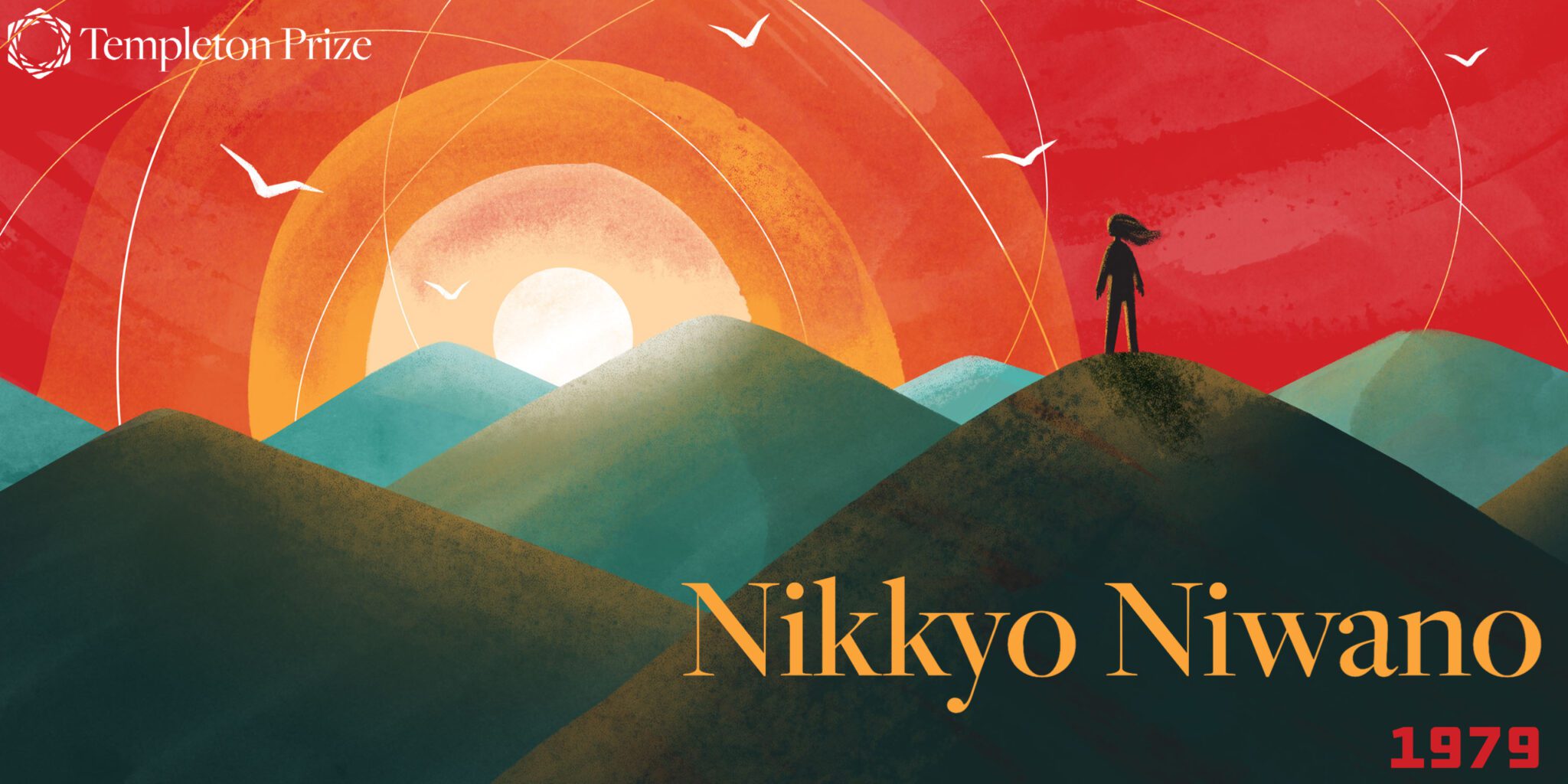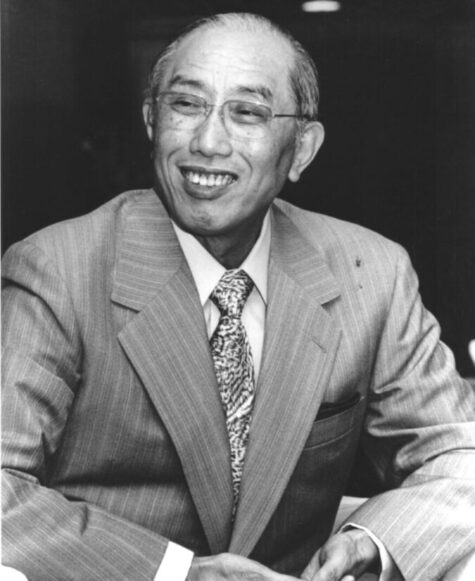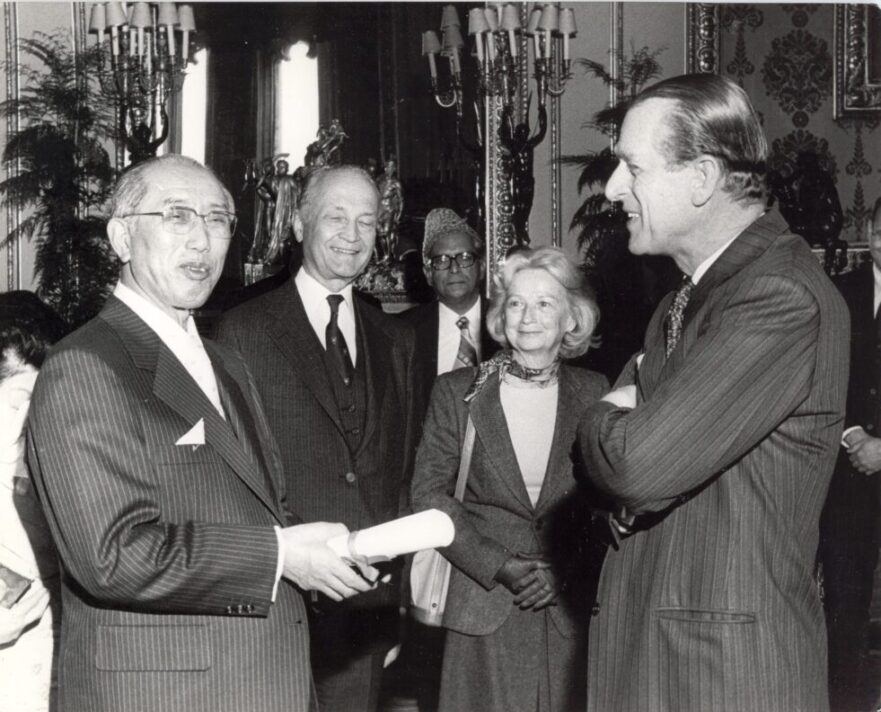In 1973, the first Templeton Prize was given to Mother Teresa. In 2023, we celebrate the 50th anniversary of this award. Over the next 52 weeks, we will highlight each of our laureates and reflect on their impact on the world. From humanitarians and saints to philosophers, theoretical physicists, and one king, the Templeton Prize has honored extraordinary people. Together, they have pushed the boundaries of our understanding of the deepest questions of the universe and humankind’s place and purpose within it, making this (we humbly think) the world’s most interesting prize.
Nikkyo Niwano, a preeminent religious leader and interfaith campaigner, co-founded the Japanese Buddhist movement Rissho Kosei-Kai and founded the World Conference on Religion and Peace.
Born into a farming family in northern Japan in 1906, Niwano grew up facing the most extreme winter weather in the country. Just days after moving to Tokyo at the age of 17, the great earthquake of 1923 demolished the city and Niwano returned home. A year later, he returned and worked as a gardener before joining the Navy. After three years, Niwano concluded his service, began working in a charcoal shop, and started his family. The owner of the charcoal shop was a fortune teller, which piqued Niwano’s interest in traditional folk religion.
It was after two of his children became very ill when Niwano became interested in folk spirituality and faith healing, which prompted him to join the new religious movement called Reiyukai. Later, he and his friend Masa Naganuma founded Rissho Kosei-kai, regarded by the Japanese government as a new religion that combined folk and Nichiren Buddhist elements. The teachings of Rissho Kosei-kai derive from the Lotus Sutra. The practice of Rissho Kosei-kai is two-fold: to achieve buddha nature toward oneself and toward others.
-

Nikkyo Niwano
Niwano spent 10 years studying the Lotus Sutra in the countryside before returning to Rissho Kosei-kai as a layperson. Naganuma passed away shortly thereafter. He refocused the religion on the teachings of the Lotus Sutra and incorporated the Buddhist elements of compassion for suffering and peace into its practices. This new direction led to Rissho Kosei-kai’s engagement in peacebuilding and relief campaigns in Southeast Asia and Africa. Niwano furthered the efforts of the United Nations (UN), the Vatican, and the World Council of Churches, and partnered with many other organizations.
Niwano was awarded the Templeton Prize for his later work as a founder of the World Conference on Religion and Peace (WCRP), which affirmed religious commitments to peace and shared action across the world. WCRP held several convenings and catalyzed regional and local networks in Africa, Asia, Europe, and North America. Now known as “Religions for Peace,” the group continues to unite a multi-faith community in response to the world’s pressing issues and complex problems.
-

Nikkyo Niwano accepting The Prize from HRH Prince Phillip
Prince Philip, Duke of Edinburgh, presented the Seventh Annual Prize for Progress in Religion to Mr. Niwano at Windsor Castle on March 30, 1979. They were joined by many special guests, including Mr. Leo Tindemans, former prime minister of Belgium, who spoke at the event.
“Working alone, I may fail. Working alone, you may fail. But success is open to both of us if we work together.” – Nikkyo Niwano
“I then think of the great importance Mr. Niwano attaches to upbringing and education, to his constant concern to care for people afflicted by misery and suffering. To his concern with hospitals and medical treatment. Relief and aid programmes in South East Asia, his concern for peace and his desire to mobilize all the religious forces of the world in order to secure peace.” – Mr. Leo Tindemans
“Mr. Niwano’s gift to us is his vision for all of us as children of God. Whether we come as Buddhist, Muslim or Christian, Jew or Hindu, he has tried to foster a climate whereby man’s love and understanding of God can flourish. For this gift we honour him and we thank him.” – Mr. John M. Templeton
Still Curious?
Learn more about 1979 Templeton Prize laureate Nikkyo Niwano


